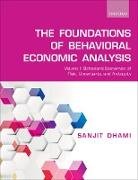This first volume of The Foundations of Behavioral Economic Analysis covers the opening topic found in this definitive introduction to the subject: the behavioral economics of risk, uncertainty, and ambiguity. It is an essential guide for advanced undergraduate and postgraduate students seeking a concise and focused text on this important subject, and examines how the decision maker chooses his optimal action in the presence of risk, uncertainty, and ambiguity.This updated extract from Dhami's leading textbook allows the reader to pursue subsections of this vast and rapidly growing field and to tailor their reading to their specific interests in behavioural economics.


